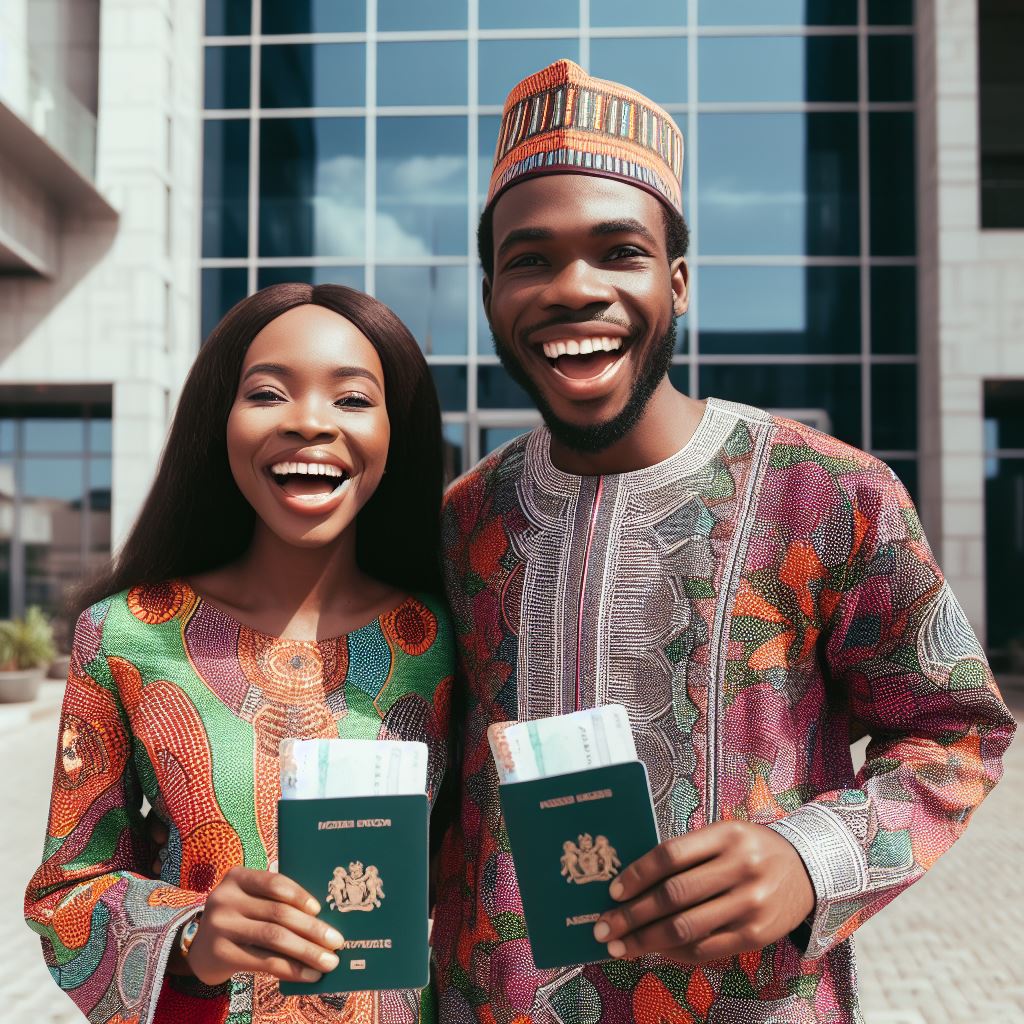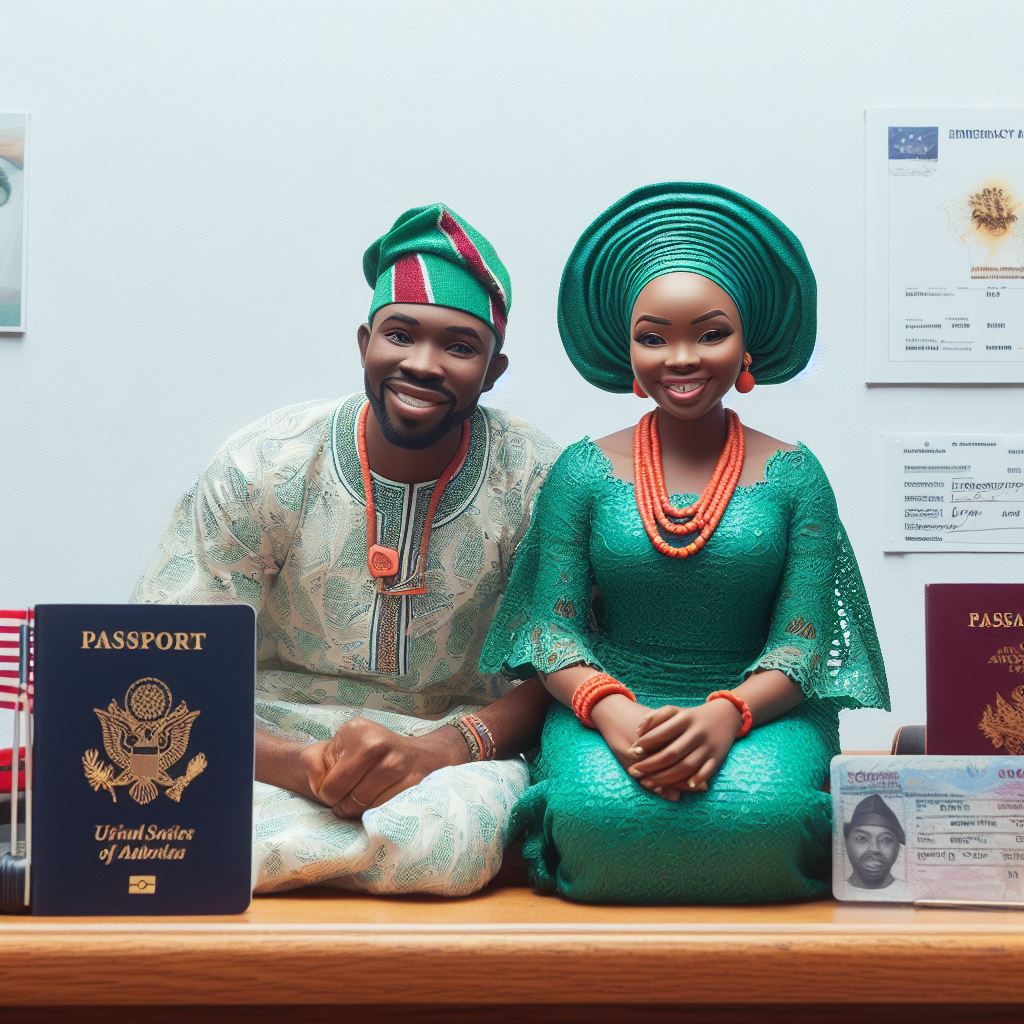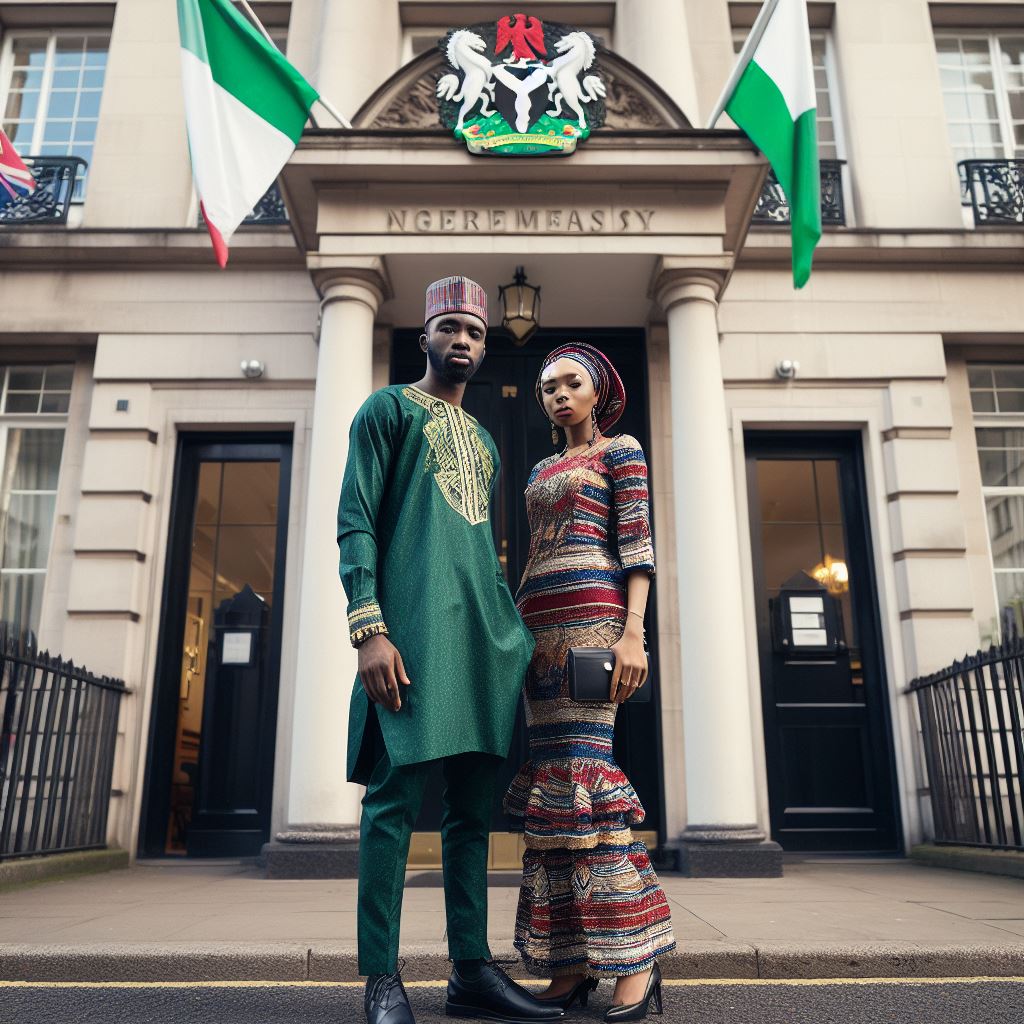Introduction
Let’s explore interviews & documentation: Preparing for the citizenship process.
In this blog section, we will discuss the importance of interviews and documentation in the citizenship process.
These are crucial steps for individuals seeking citizenship in Nigeria.
Interviews play a significant role in determining an applicant’s eligibility for citizenship.
They provide an opportunity for officials to assess the applicant’s knowledge of the country’s history, culture, and legal system.
Documentation is also essential in the citizenship process.
Applicants must submit various documents, such as birth certificates, passports, and residency permits, to prove their identity and eligibility.
The citizenship process in Nigeria involves several stages.
Firstly, the applicant must complete and submit an application form.
This form requires personal information, employment history, and details about the applicant’s family.
After submitting the application, the applicant may be called for an interview.
During the interview, the applicant will be asked questions regarding their background, reasons for seeking citizenship, and knowledge about Nigeria.
Following the interview, the applicant must provide necessary documentation to support their application.
These documents should be authentic and up-to-date.
Any false information or fraudulent documents can result in rejection or legal consequences.
Once the application and documentation are reviewed, a decision will be made on whether to grant citizenship.
This decision is based on the applicant’s eligibility, adherence to the citizenship requirements, and successful completion of the interview.
In short, interviews and documentation are vital in the citizenship process in Nigeria.
They help officials assess an applicant’s qualifications and verify their identity.
It is crucial for applicants to carefully prepare for interviews and ensure that all documentation is accurate and genuine.
Types of Interviews
Naturalization interview
Purpose of the naturalization interview
The naturalization interview is conducted to assess an applicant’s eligibility for U.S. citizenship.
What to expect during the interview
During the interview, the applicant will be asked questions about their background, application, and English proficiency.
Tips for preparing for the naturalization interview
- Review your application and supporting documents to ensure accuracy.
- Practice answering potential interview questions.
- Familiarize yourself with the N-400 form and the naturalization process.
- Bring all required documents to the interview.
- Dress appropriately and arrive early for your appointment.
Marriage interview
Purpose of the marriage interview
A marriage interview is conducted to determine the authenticity of a marriage-based green card application.
What to expect during the interview
During the interview, the couple will be questioned individually and jointly about their relationship.
Tips for preparing for the marriage interview
- Collect and organize documents that prove the authenticity of your marriage.
- Practice answering questions about your spouse, relationship, and daily life together.
- Be honest and consistent in your answers.
- Ask your immigration attorney for guidance and support.
- Arrive together with your spouse and dress professionally for the interview.
Interviews are an important part of the citizenship process, with two primary types: naturalization interviews and marriage interviews.
Naturalization interview
The purpose of a naturalization interview is to determine an applicant’s eligibility for U.S. citizenship.
During the interview, applicants will face questions regarding their background, application, and English proficiency.
It is crucial to prepare thoroughly for this interview by reviewing the application, practicing potential questions, and familiarizing oneself with the N-400 form and the process.
Bringing all the required documents, dressing appropriately, and arriving early are essential tips to consider.
Marriage interview
On the other hand, a marriage interview is conducted to assess the authenticity of a marriage-based green card application.
The interviewing officer will question both partners separately and jointly about their relationship, aiming to confirm its validity.
Before the marriage interview, couples should collect and organize documents that prove the authenticity of their marriage.
Practicing answers to questions regarding their spouse, relationship, and daily life together is highly recommended.
Additionally, honesty, consistency, and seeking guidance from an immigration attorney are essential steps to prepare for this interview.
Properly preparing for both types of interviews significantly increases the chances of a successful outcome in the citizenship process.
By following these tips and being thoroughly prepared, applicants can face their interviews with confidence and provide accurate and consistent information, demonstrating their eligibility for U.S. citizenship.
Read: Potential Pitfalls: Citizenship Through Marriage in Nigeria
Required Documentation
It is important to gather and prepare all the required documentation before your citizenship interview.
These documents serve as evidence to support your application and verify your eligibility for citizenship.
Here is a detailed list of the documents you need to provide:
General documents
- Valid identification documents: Ensure that your identification documents, such as a driver’s license or passport, are still valid and not expired. These documents will help establish your identity.
- Birth certificate: You will need a copy of your birth certificate to prove your date and place of birth. This document is essential in establishing your eligibility for citizenship.
- Proof of residency: You need to submit documents that show your current residential address, like utility bills or rental agreements. This helps establish your continuous residency in the country.
- Police clearance certificate: Obtaining a police clearance certificate is crucial as it confirms that you have no criminal record. It is mandatory for the citizenship process.
Documentary evidence for naturalization
- Proof of proficiency in English language: You must demonstrate your ability to speak, read, and write in English. This can be done by providing language test results or certificates from recognized institutions.
- Proof of residency and ties to Nigeria: As part of the naturalization process, you need to establish your connections to Nigeria. This can be done through documents like tax records, employment history, or property ownership.
- Supporting documents for good character assessment: You should provide supporting documents to prove your good moral character. This can include recommendation letters, community service records, or school transcripts.
Documentary evidence for marriage-based citizenship
- Marriage certificate: If you are applying for citizenship based on marriage to a Nigerian citizen, you need to provide a copy of your marriage certificate.
- Proof of genuine marital relationship: You must provide evidence that your marriage is a bona fide union and not solely for the purpose of obtaining citizenship. This can include joint lease agreements, photographs, or affidavits from friends and family.
- Joint financial documents: Documents showing joint ownership of assets, shared bank accounts, or financial responsibilities can prove the authenticity of your marital relationship.
Remember, it is crucial to gather all the necessary documentation and ensure their accuracy before your citizenship interview.
Missing or inaccurate documents can delay or even jeopardize your application process.
Read: True Stories: Journeys to Nigerian Citizenship by Marriage

Preparing for Interviews
Preparing for the citizenship process involves careful preparation and understanding of the interview component.
To ensure a successful interview, it is important to diligently research common interview questions and practice answering them.
Researching interview questions
1. Common interview questions for naturalization process
Before the interview, it is essential to familiarize yourself with the typical interview questions asked during the naturalization process.
By understanding what may be asked, you can better prepare effective answers that showcase your knowledge and commitment to becoming a citizen.
2. Common interview questions for marriage-based citizenship
Additionally, if you are applying for citizenship based on marriage, it is crucial to be aware of the interview questions specific to this type of application.
These questions may differ from the general naturalization questions, focusing more on your relationship history and marriage validity.
Researching and practicing these questions will help you feel more confident and prepared.
Practice interviews
1. Conducting mock interviews with a partner or friend
To enhance your interview skills, consider conducting mock interviews with a partner or friend.
This simulation allows you to experience the interview setting and practice answering questions in a realistic manner.
You can gather feedback from your partner or friend to identify areas for improvement.
2. Seeking professional assistance for practice interviews
Seeking professional assistance for practice interviews is also a valuable option.
Immigration experts or attorneys can provide guidance and valuable feedback on your interview performance.
Their expertise can help you identify any weaknesses and fine-tune your answers, ensuring you present yourself in the best possible light during the actual interview.
Maintaining a confident and truthful demeanor
1. Tips for staying calm and focused during interviews
During the interview, it is crucial to maintain a calm and focused demeanor.
Employ relaxation techniques, such as deep breathing or positive visualization, to help manage any nervousness or anxiety.
Staying calm will allow you to articulate your answers effectively and demonstrate your readiness for citizenship.
2. Importance of honesty during the interview process
Above all, honesty is essential throughout the interview process. It is crucial to portray yourself truthfully and provide accurate information.
Inconsistencies or falsehoods can harm your application and may lead to serious consequences.
Being transparent and forthcoming with the interviewer will establish credibility and increase your chances of a successful interview.
By carefully preparing for interviews, you increase your chances of a successful citizenship process.
Researching interview questions, practicing with mock interviews, and maintaining a confident and truthful demeanor are all integral parts of your preparation.
Approach the interview with the knowledge and confidence necessary to achieve your citizenship goals.
Read: Busting Myths: Nigerian Marriage and Citizenship Facts
Learn More: Marriage is Honourable: Celebrating Milestones in Nigerian Weddings
Tips for Document Submission
Having the necessary documents ready is an indispensable part of the citizenship process.
If you want your application to go smoothly and be successful, you need to properly organize and submit the required documents.
In this section, we will provide you with some useful tips regarding document submission.
Organizing and Arranging Documents
One of the first things you should do when preparing for the citizenship process is to create a checklist of all the required documents.
This way, you can ensure that you have everything in order and avoid any last-minute panic.
Review the list carefully and make sure you have obtained all the necessary documents before proceeding with the application.
Once you have gathered all the required documents, it is important to organize them in a systematic manner.
This means arranging them in a logical order that makes it easy for the immigration officer to review and verify them.
You can use dividers or labeled folders to separate different types of documents such as identification, residency proof, and employment records.
This will help you present your case clearly and impress upon the officer that you have taken the process seriously.
Making Certified Copies of Original Documents
Some documents, such as birth certificates, marriage certificates, and academic degrees, may require certification.
Certified copies of these documents hold the same legal value as the original ones.
To obtain certified copies, you need to follow a specific procedure set by the issuing authority.
Contact the relevant authority, such as the city clerk’s office or the educational institution, to understand the process for obtaining certified copies.
Follow their instructions carefully and provide any necessary documentation or fees.
Keep in mind that the process may take some time, so it is advisable to start early and factor in any potential delays.
While obtaining certified copies is important, it is equally crucial to preserve the original documents.
Original documents may be required for future reference or as evidence of your identity and qualifications.
Store them in a safe place, such as a lockable filing cabinet or a secure storage facility.
Make sure they are protected from damage and potential loss.
In summary, organizing and arranging your documents and making certified copies of original documents are vital steps in preparing for the citizenship process.
By following these tips, you can ensure that your document submission is organized, complete, and effective.
Remember, the proper documentation is crucial for a successful citizenship application.
Read: The Legal Implications of Marrying for Citizenship
Delve into the Subject: The Impact of Westernization on Nigerian Marital Systems
Conclusion
Interviews and documentation play a crucial role in the citizenship process.
They help immigrants present their case accurately and provide evidence of their eligibility for citizenship.
To enhance their chances of success, applicants should thoroughly prepare for interviews, gather all required documents, practice answering potential questions, and seek professional assistance if needed.




